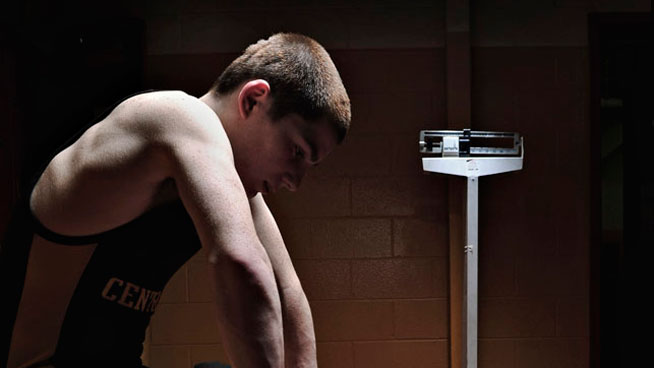Opinion: Weight cutting or starvation?
How impressionable young boys are lured into the dark world of restrictive eating and excessive exercise through toxic sports culture
November 29, 2021
Insecurities, control issues, and depression are a few of the many commonly acknowledged reasons for the development of eating disorders. But what is far less recognized is when one is encouraged, is praised, to develop disordered eating habits in the name of a high school sport. Unfortunately, wrestling normalizes pressuring young athletes to rapidly lose weight, forcing them to engage in means identical to symptoms of anorexia or bulimia.
Unlike many other high school sports, wrestling revolves greatly around an athlete’s weight. Wrestlers are categorized into weight classes that determine who they can compete against. Typically, only wrestlers of the same weight class can compete against each other, making sure that there are no physical advantages to one wrestler.
While in theory, this sounds reasonable, in practice, it opens up the door to extreme weight-consciousness for developing young boys. Dropping a few pounds to get into a lower weight class can give a wrestler a greater advantage in a match—but at what cost?
In wrestling terms, this rapid weight loss is called “weight cutting.” Weight cutting often requires athletes to lose a significant amount of weight in a short period of time, but the only way to do this is by extreme exercise or food restriction.
Teenage boys who compete in wrestling often starve themselves or restrict their food intake for weeks leading up to a match, and these actions can have serious consequences. Restlessness, fatigue, and irritability are all symptoms that come with an extreme calorie deficit, not to mention that these habits are addicting and can transform into a full-blown eating disorder later on, which can harbor far worse consequences.
Then after this harsh diet, all that is left is water weight, which wrestlers also need to rid themselves of. In order to do this, they dress in many layers of clothing and perform rigorous exercises while in this clothing to essentially sweat out whatever remaining weight they have left. Sounds a bit like exercise bulimia, doesn’t it? By sweating out their weight and wearing all these layers, these wrestlers can seriously dehydrate themselves, experience heat exhaustion, and possibly even have a heat stroke.
So why is it, then, that these habits are so normalized in a high school setting where coaches are supposed to be looking out for the best interest of their players? For one, eating disorders in boys are unfortunately far less recognized than those in girls, along with many other mental illnesses due to toxic masculinity preventing men from being seen as vulnerable. This along with sports culture leaves no room for a discussion of mental health, as sports rely so heavily on doing whatever it takes–physically and mentally–to win.
But this should not excuse these horrible habits imparted on impressionable young athletes. Because most high school wrestlers are minors, coaches should take more responsibility upon themselves to protect their players from engaging in disorderly behaviors. Instead of encouraging them to go through these drastic measures to meet a lower weight class, coaches should allow their players to maintain their usual weight while improving their skills. There is no justification for a teenager to put their own health at risk in order to win, because in the long run, the momentary satisfaction of victory will never outweigh the consequences of the physical and mental drain that comes with the competitiveness of this sport.
